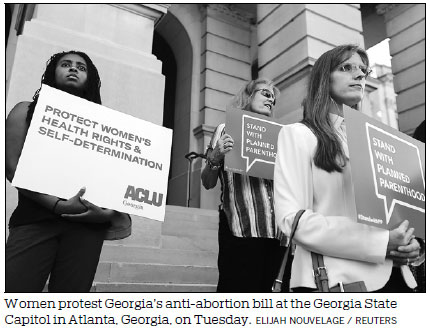Alabama delays vote on abortion ban
Bill postponed after objections: State senate may resume debate next week
US Alabama state senate postponed a vote on Thursday on what could be the nation's toughest antiabortion bill.
The postponement occurred when exceptions for rape and incest were removed from the measure without a roll-call vote, sparking shouted objections from lawmakers in the legislative chamber.
If signed into law, a doctor performing an abortion could be sentenced to 10 to 99 years in prison; a woman undergoing the procedure would not face criminal charges.
Alabama State Representative Terri Collins, a Republican and sponsor of the bill, said the legislation is intended to create a court challenge to Roe versus Wade, the 1973 US Supreme Court decision that struck down state abortion bans in the first three months of pregnancy.
"In Alabama law, it is already recognized that this baby in the womb is already a person," Collins told the Montgomery Advertiser, a daily newspaper and a news website. "If an expecting mother is killed by a drunken driver, that drunken driver is accused of double homicide because the baby is already recognized."
The state Senate is expected to resume debate on the bill next week. The House had earlier passed the measure without exceptions for rape and incest.
In neighboring Georgia, Governor Brian Kemp signed a bill earlier this week, which effectively bans abortion after six weeks of pregnancy. Georgia joins Mississippi, Kentucky and Ohio in banning abortion when doctors can detect a fetal heartbeat, typically at six weeks.
"We will not back down," Kemp said, as he anticipated legal challenges to the law. "We will always continue to fight for life."
Exceptions to the Georgia law include an abortion needed to save the woman's life or to prevent serious harm as well as cases of rape or incest if a police report has been filed.
Sean J. Young, legal director of the American Civil Liberties Union of Georgia in Atlanta, vowed to challenge the law in court.
"The abortion ban signed by the governor is blatantly unconstitutional under US Supreme Court precedent," Young told China Daily. "Every federal court that has heard a challenge to such a ban has struck it down. The law goes into effect in January 2020 and we will file a lawsuit well in advance. We will see the governor in court."
Genevieve Wilson, spokeswoman for Georgia Right to Life, a pro-life advocacy organization in suburban Atlanta, said she was optimistic the bill would be upheld by the courts.
"The strong personhood language in the law is different from others in that it says the child in the womb is a natural person," Wilson told China Daily. "We believe this would allow the courts to consider it. There's also a severability clause in the law so some provisions could be struck down while others could remain. I'm optimistic the personhood provisions in the law would remain."
A judge in Kentucky blocked that state's law and a federal judge is expected to hear a legal challenge to Mississippi's law later this month. Courts have declared similar laws in Iowa and North Dakota unconstitutional.
Arkansas has limited abortion to 20 weeks, but a bill now in the state legislature would prohibit the procedure 18 weeks into a pregnancy. Lawmakers in South Carolina and Tennessee are considering heartbeat bills.
In 1972, the US Supreme Court voted 7-2 to overturn state abortion bans, ruling that a women's right to an abortion was covered by the right to privacy established in a previous case, Griswold versus Connecticut, and protected by the Fourteenth Amendment adopted in 1868 following the American Civil War. The decision gave a woman control of her pregnancy in the first three months and set aside 46 state abortion laws.
The high court's ruling continues to spark sharp debate. In general, Democrats call themselves "prochoice" while Republicans say they are "pro-life". Those who oppose abortion believe the current 5-4 conservative majority on the US Supreme Court would overturn Roe versus Wade and return full control of the issue to the states where "heartbeat" laws like Georgia's could take effect.
But the justices must agree to hear a challenge and to date have rejected all cases seeking to set aside the Roe versus Wade precedent. However, the Supreme Court temporarily blocked a Louisiana anti-abortion law but has not yet decided if it will hear a challenge to the statute. Some states, including New York and California, allow abortion through the 28th week, the Guttmacher Institute - a research and policy organization advancing sexual and reproductive health and rights in the US and globally - reported.
scottreeves@chinadailyusa.com

(China Daily 05/11/2019 page7)














